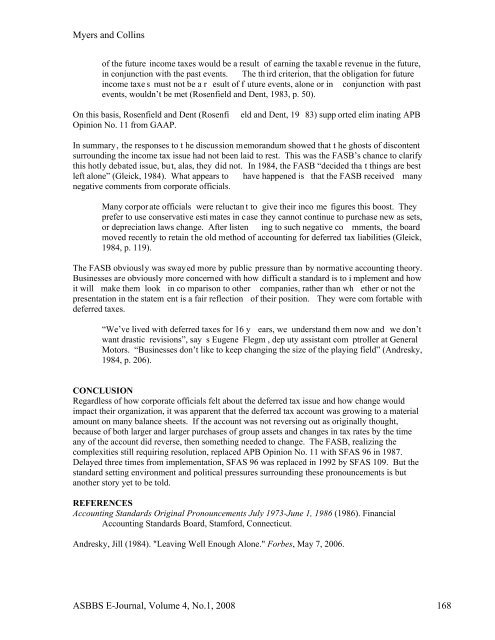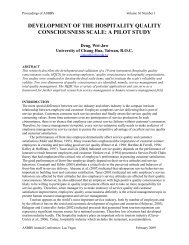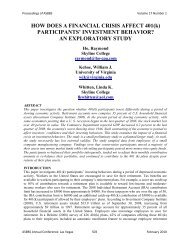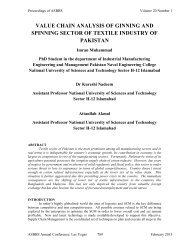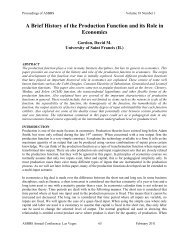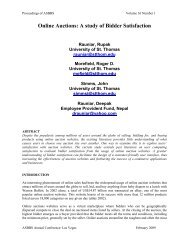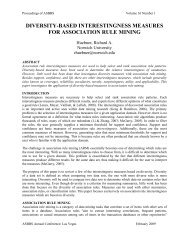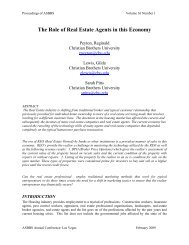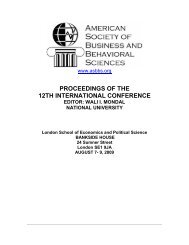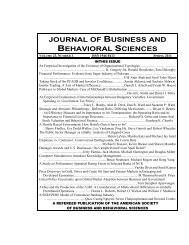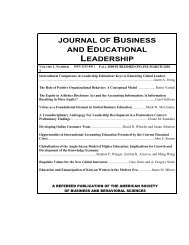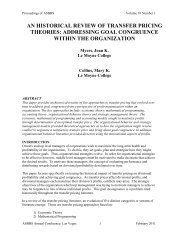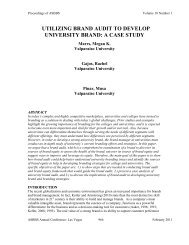stock repurchase announcements: a test of market ... - Asbbs.org
stock repurchase announcements: a test of market ... - Asbbs.org
stock repurchase announcements: a test of market ... - Asbbs.org
Create successful ePaper yourself
Turn your PDF publications into a flip-book with our unique Google optimized e-Paper software.
Myers and Collins<br />
<strong>of</strong> the future income taxes would be a result <strong>of</strong> earning the taxabl e revenue in the future,<br />
in conjunction with the past events. The th ird criterion, that the obligation for future<br />
income taxe s must not be a r esult <strong>of</strong> f uture events, alone or in conjunction with past<br />
events, wouldn’t be met (Rosenfield and Dent, 1983, p. 50).<br />
On this basis, Rosenfield and Dent (Rosenfi eld and Dent, 19 83) supp orted elim inating APB<br />
Opinion No. 11 from GAAP.<br />
In summary, the responses to t he discussion memorandum showed that t he ghosts <strong>of</strong> discontent<br />
surrounding the income tax issue had not been laid to rest. This was the FASB’s chance to clarify<br />
this hotly debated issue, but, alas, they did not. In 1984, the FASB “decided tha t things are best<br />
left alone” (Gleick, 1984). What appears to have happened is that the FASB received many<br />
negative comments from corporate <strong>of</strong>ficials.<br />
Many corpor ate <strong>of</strong>ficials were reluctan t to give their inco me figures this boost. They<br />
prefer to use conservative esti mates in case they cannot continue to purchase new as sets,<br />
or depreciation laws change. After listen ing to such negative co mments, the board<br />
moved recently to retain the old method <strong>of</strong> accounting for deferred tax liabilities (Gleick,<br />
1984, p. 119).<br />
The FASB obviously was swayed more by public pressure than by normative accounting theory.<br />
Businesses are obviously more concerned with how difficult a standard is to i mplement and how<br />
it will make them look in co mparison to other companies, rather than wh ether or not the<br />
presentation in the statem ent is a fair reflection <strong>of</strong> their position. They were com fortable with<br />
deferred taxes.<br />
“We’ve lived with deferred taxes for 16 y ears, we understand them now and we don’t<br />
want drastic revisions”, say s Eugene Flegm , dep uty assistant com ptroller at General<br />
Motors. “Businesses don’t like to keep changing the size <strong>of</strong> the playing field” (Andresky,<br />
1984, p. 206).<br />
CONCLUSION<br />
Regardless <strong>of</strong> how corporate <strong>of</strong>ficials felt about the deferred tax issue and how change would<br />
impact their <strong>org</strong>anization, it was apparent that the deferred tax account was growing to a material<br />
amount on many balance sheets. If the account was not reversing out as originally thought,<br />
because <strong>of</strong> both larger and larger purchases <strong>of</strong> group assets and changes in tax rates by the time<br />
any <strong>of</strong> the account did reverse, then something needed to change. The FASB, realizing the<br />
complexities still requiring resolution, replaced APB Opinion No. 11 with SFAS 96 in 1987.<br />
Delayed three times from implementation, SFAS 96 was replaced in 1992 by SFAS 109. But the<br />
standard setting environment and political pressures surrounding these pronouncements is but<br />
another story yet to be told.<br />
REFERENCES<br />
Accounting Standards Original Pronouncements July 1973-June 1, 1986 (1986). Financial<br />
Accounting Standards Board, Stamford, Connecticut.<br />
Andresky, Jill (1984). "Leaving Well Enough Alone." Forbes, May 7, 2006.<br />
ASBBS E-Journal, Volume 4, No.1, 2008 168


